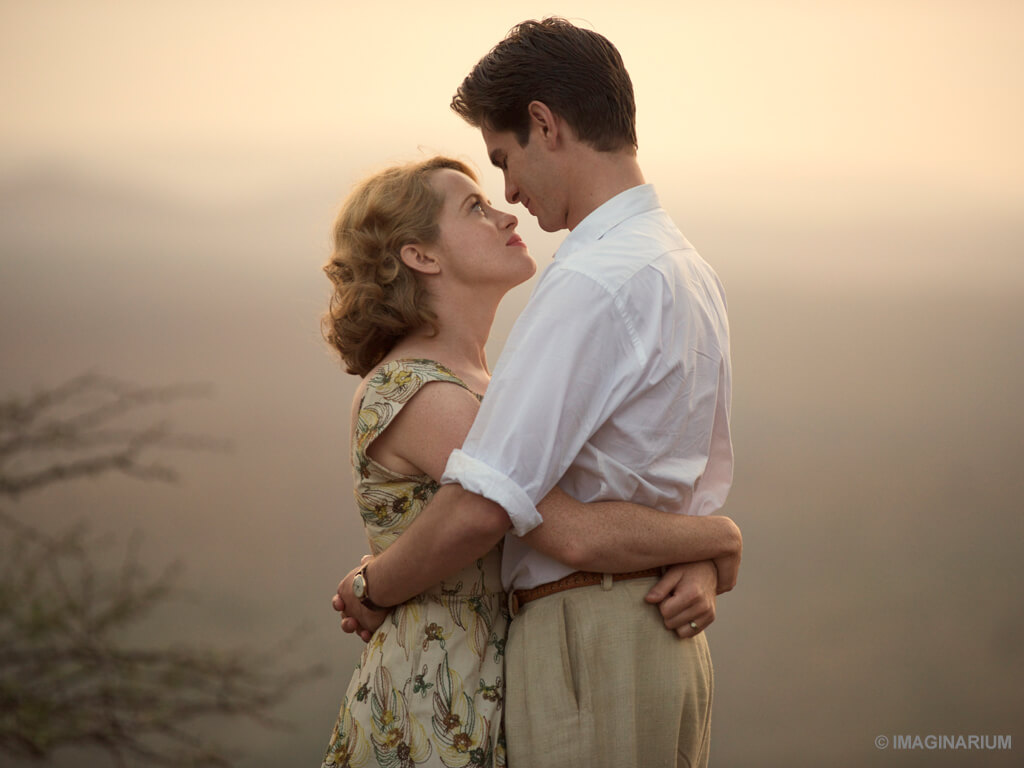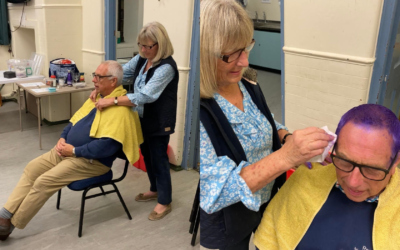Breathe stars Andrew Garfield as Robin Cavendish who contracted the disease in Africa and undeterred by his condition, spent the rest of his life advocating for people with disabilities and popularising a new wheelchair with a built-in respirator.
Along with co-star Claire Foy and Director, Andy Serkis, Garfield has been showing his support for Rotary’s fight to eradicate the disease forever.
Rotary is doing amazing things!”
Speaking on the Andrew Marr Show, Garfield said: “There are a number of great organisations who are working to eradicate polio entirely, and we’re very, very close. Rotary is doing amazing things!”
Actor Andrew Garfield on his British polio survivor film #Breathe. A reminder that #WorldPolioDay is Tuesday 24th October #EndPolio pic.twitter.com/SQaLSCTb1O
— The Andrew Marr Show (@MarrShow) October 22, 2017
According to Jonathan Cavendish, the film’s producer and Robin’s son, it is the most expensive home movie ever made.
Breathe was given its European Premiere at the London Film Festival earlier this month, and now, in the week the we celebrated World Polio Day, the film is receiving its national release at cinemas across the UK and Ireland.
“It’s a producer’s dream!”
Jonathan took part in a question and answer session at the London Film Festival with Eve Conway, past president of Rotary in Great Britain and Ireland who is also vice-chairman of the Rotary International End Polio Now: Countdown to History Campaign Committee.
Here are some of the highlights:
How did the film come about?
As a film producer you are looking for stories all the time. I am a bit slow-witted, so it took me a bit of time to realise I was sitting on an amazing story. With that came the responsibility of not messing up the film about my own parents, which would be embarrassing, but also, because of the extraordinary things you saw that my parents achieved in terms of disability and changing people’s lives.
How did the script come about?
I hired one of the best writers in the world, Bill Nicholson, who wrote films like Gladiator. He was great, because I did a film with him called ‘Elizabeth: The Golden Age’ with Cate Blanchett a few years ago. I told him afterwards about the story of my parents, and he said: “I’d like to write that, but on one condition: you don’t pay me until the film happens”.
That is a producer’s dream. I asked why, and he said because he was a very expensive writer, someone else could own the script and control it, and the film could be made without my mother’s or my consent.
What did you think about Andrew Garfield and Claire Foy playing your parents?
I remember the first time I met them I knew that they could be my parents in spirit, in body and in everything else. You’ve never met my dad, but the extraordinary thing is there he is on a big screen.
It’s not just an amazing performance, he has become somebody who died 23 years ago, and that is a bit weird, but also marvellous and magnificent. My mother is still very much alive, 83-years-old, loving it, thinking it is all a bit of a fuss launching this movie, but having a lovely time and quietly quite proud, I think.


How different was living with polio 50 years ago?
When my father was struck down with polio, exactly as it is shown in the film, he didn’t want to go on living but my mother persuaded him round. In those days, no-one in the world with that degree of disability lived outside a hospital.
They just didn’t. The medical establishment didn’t believe it was possible because my father was two minutes away from death at any time. In those days, machines were unreliable, there were power cuts, it was a very risky business. But they decided to move out of hospital because they would rather have a quality of life than live the rest of their lives in hospital.
The thing to remember about the 1960s is that we were all frightened about the things we didn’t know. Nobody had ever met anyone with that degree of disability.
There were people who were frightened by it, and people who would shout at us across the street for my father being in a wheelchair and being out of hospital, believe it or not. Can you imagine?
What was your father like?
My dad was a very nice, inspirational and charming man, something which the director Andrew Serkis has captured. What my dad wanted to do was to put everyone else at ease.
So his entire way of being was to make everyone else feel at home with him and he imbued that spirit with all the other disabled people who he encouraged to move out of hospital, for whom he had those chairs made. It was all about quality of life.
Why did you make the film?
I wanted people to see what you can do when you are dealt this horrific blow if you have the stars aligned in the right way and if you have the will-power. My parents were very lucky.
They fell in love at first sight and they were as in love with one another on the day my father died. That is an extraordinary thing, but it also requires will-power because it wasn’t easy.
What is your favourite moment of the film?
Each time I see the film I have a favourite moment. It is very scary when you watch a film with a crowd of people because, every time somebody gets up to have a pee, or coughs, it is a nightmare because you think they are not concentrating and they don’t like it.
So you can’t really enjoy the film. But at the premiere, my favourite moment was the moment the look Dr Khan gives when my mother tells him that my father is going to leave hospital. It is that look of astonishment.
Even though you produced the film, why did you not direct it?
I am a producer for good reason. I am a story teller, but I am also very colour blind. You either have a good eye or you don’t. I did consider directing this film, but it was all about making the best movie. I thought it was important I get the best writer, the best director and the best actors.
As a team it was incredibly collaborative. Every second or every moment of the film was designed by Andy (Serkis) and I together. Andy is a great, great actor, a visual person and a visionary. He is also one of my closest friends, and he knows my mother well. He knows the world of disability well and I just knew instinctively that he would make a brilliant film.
What is the underlying message of Breathe?
It is about the power of love. It is about trying to find the person to live your life with, who is going to get the best out of you and who you are going to get the best out of. When something terrible happens, you can deal with it.
Breathe is out in cinemas across the United Kingdom from 27th October, distributed by STXinternational.










